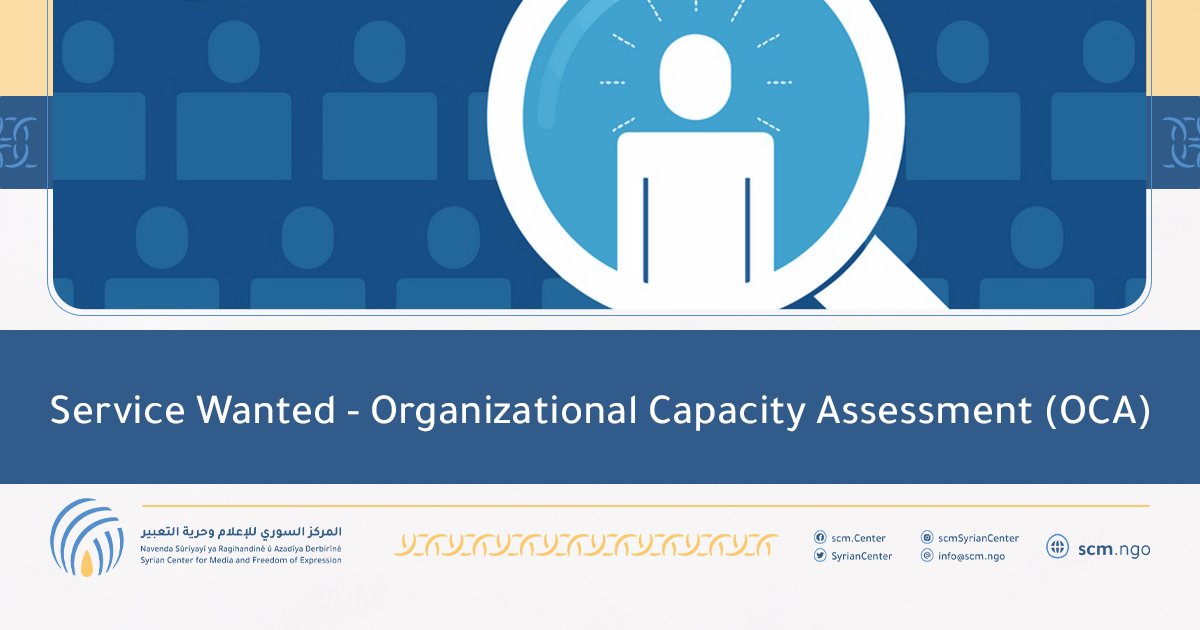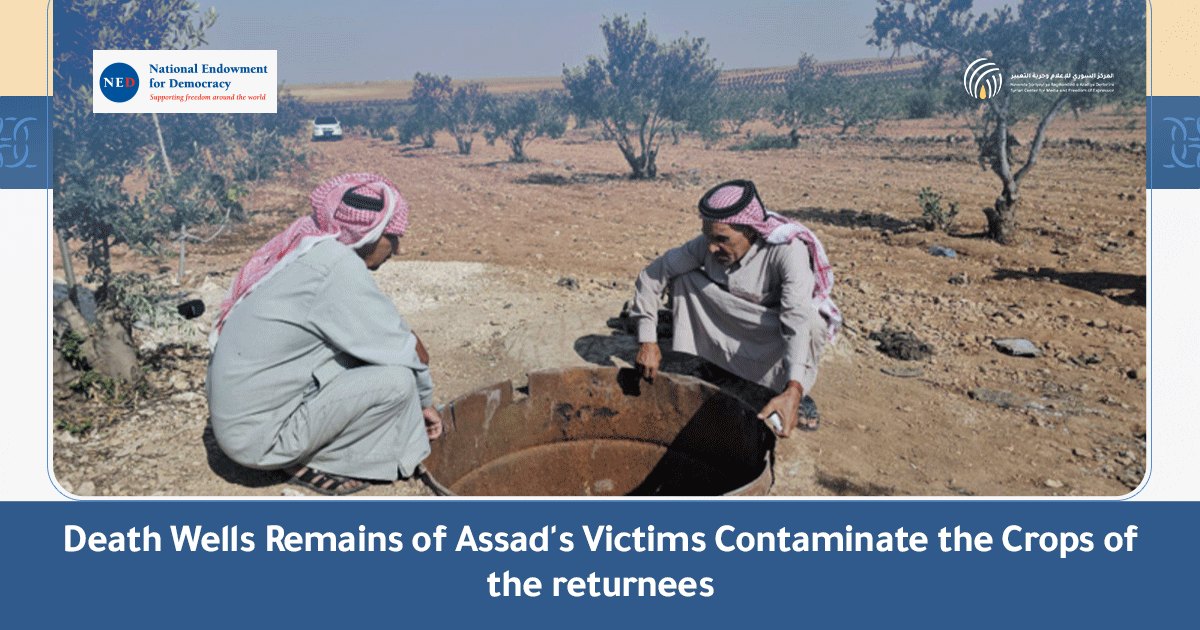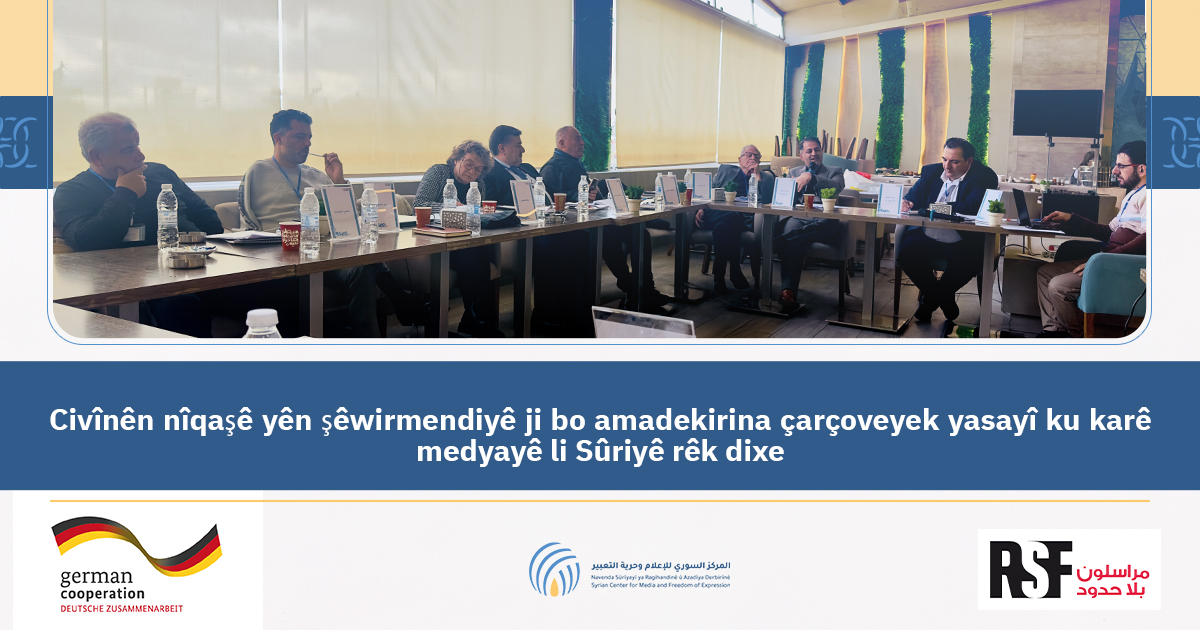Introduction
The purpose of this Terms of Reference (ToR) is to outline the scope, objectives, methodology, and expected deliverables for an Organizational Capacity Assessment (OCA) for The Syrian Center for Media and Freedom of Expression (SCM). This assessment aims to evaluate the organization’s internal capacity, strengths, weaknesses, and areas for improvement to enhance its effectiveness and sustainability.
Objectives
The primary goal of this consultancy is to conduct a thorough examination of SCM’s internal processes, and practices across critical functional areas. It is specifically designed to identify strengths, areas for improvement, and strategic opportunities with a strong emphasis on fostering long-term sustainability on both financial and impact levels. The main objectives are:
- Identify strengths and weaknesses within the organization’s current capacities.
- Determine specific areas that require improvement or enhancement.
- Develop actionable recommendations to strengthen the organization’s capacity.
- Support the organization in achieving its mission and goals more effectively.
Scope of the consultancy
The consultancy will cover the following areas:
- Human Resources;
- Financial and procurement management;
- Communication and outreach;
- Data management and archiving;
- Organizational workflow;
- Fundraising management.
A detailed description of the scope of work expected in area can be consulted in Annex 1
Methodology
The consultancy will have two components:
The Organizational Capacity Assessment: will involve a combination of the following methods:
- Document Review: Examination of relevant organizational documents, reports, policies, and any other records which might be important for the task.
- Surveys and Interviews: Conducting surveys and interviews with staff, board members, in addition to donors, and beneficiaries, if needed.
- SWOT Analysis: Identifying strengths, weaknesses, opportunities, and threats.
- Data Analysis: Based on the previously mentioned information, analyzing quantitative and qualitative data to draw conclusions and recommendations.
Based on the OCA results, the Capacity Development: will involve the following:
- Update SCM policies and procedures in the assessed areas.
- Develop SCM operational manual (Workflow matrix for the organization).
- To be agreed upon: Provide up to 10 coaching sessions in response to the most urgent gaps if identified.
Deliverables
The following deliverables are expected as part of the Capacity Assessment:
- Comprehensive Capacity Assessment Report, including findings, analysis, and recommendations.
- Presentation of the assessment findings to the organization’s leadership and stakeholders.
- Action Plan for Capacity development, outlining specific steps, responsibilities, and timelines.
- Updated policies and procedures.
- Organization’s Operational manual (Workflow matrix).
Timeline
The consultancy is expected to be completed within 12 weeks from the contract commencement date.
Qualifications of Consultant/Firm
The consultant(s) or consulting firm should have the following qualifications:
a. Demonstrated experience in conducting capacity assessments for nonprofit organizations.
b. Proven Expertise in the areas of organizational development, finance management, Human Resources, communication, Fundraising, and Data management and archiving.
c. Strong analytical and communication skills.
Proposal Submission
Interested consultants or consulting firms are invited to submit their proposals by 26.11.2023 on the email: [[email protected]].
Proposals should include a detailed work plan, methodology, budget, and references. In addition to the detailed CVs of the consultants.
Evaluation and Selection
Proposals will be evaluated based on their alignment with the organization’s needs, qualifications and proven expertise, methodology, and cost-effectiveness.
This Terms of Reference serves as a guideline for conducting the Capacity Assessment for SCM. It is subject to negotiation and modification as needed to meet the specific requirements of the organization and the selected consultant or consulting firm.
This consultancy might be given to one or more consultants/firm. Individual experts in any of the specific fields of the scope of work are also encouraged to apply.
Staffing and Organizational Structure:
Annex 1
I. Scope of Human Resources Assessment:
- Review the current organizational structure, including reporting lines, roles, and responsibilities.
- Assess the adequacy of staffing levels in relation to the organization’s programs and activities.
- Evaluate the alignment of staff skills and qualifications with the organization’s mission and goals.
HR Policies and Procedures:
- Examine existing HR policies, procedures, and templates.
- Evaluate the effectiveness of these policies in promoting a positive and productive work environment.
- Identify any gaps or areas for improvement in HR documentation and processes.
Workforce Development and Training:
- Assess the organization’s approach to staff development, including training, mentoring, and skill-building opportunities.
- Determine the extent to which staff members are encouraged and supported in their professional growth.
- Recommend strategies for enhancing workforce development and training initiatives.
Diversity, Equity, and Inclusion (DEI):
- Evaluate the organization’s commitment to diversity, equity, and inclusion within its staff and leadership.
- Analyze SCM’s policies and practices, including recruitment strategies to promote diversity and inclusivity.
- Suggest improvements or additional measures to foster a more diverse and inclusive workplace.
Performance Management:
- Review the performance management system, including goal-setting, feedback, and performance appraisals.
- Assess how performance evaluations align with the organization’s mission and objectives.
- Recommend enhancements to the performance management process to drive employee motivation and productivity.
Compensation and Benefits:
- Analyze the organization’s compensation structure and benefit packages.
- Ensure compliance with labor laws and industry standards.
- Provide recommendations on compensation and benefits adjustments to attract and retain talent.
Legal Compliance:
- Ensure the organization complies with French labor laws, including minimum wage, working hours, and workplace safety regulations.
- Verify that HR practices adhere to legal requirements related to discrimination, harassment, and employee rights.
HR Data and Information Management:
- Assess the management of HR data, including personnel records and payroll.
- Ensure data security and privacy compliance.
- Recommend improvements in HR data management systems.
Workplace Culture and Well-being:
- Evaluate the overall workplace culture and its impact on staff well-being.
- Identify any sources of workplace stress or burnout.
- Propose initiatives to promote a healthy and supportive work environment.
Financial Governance:
II. Scope of Financial Management:
- Evaluate the effectiveness of financial oversight by the board of directors, including the presence of a finance committee.
- Assess the transparency and accountability in financial decision-making processes.
- Review the organization’s adherence to financial policies and procedures.
Budgeting and Financial Planning:
- Analyze the budgeting process, including the development, approval, and monitoring of budgets.
- Assess the alignment of budgets with the organization’s strategic plan and programmatic goals.
- Examine the organization’s ability to adapt its budget in response to changing circumstances.
Financial Reporting:
- Review financial reporting practices, including the frequency and quality of financial statements.
- Evaluate the comprehensiveness and accuracy of financial reports.
- Assess the timeliness of financial reporting to inform decision-making.
Cash Flow Management:
- Assess the organization’s ability to manage cash flow, including cash reserves and liquidity.
- Review cash management policies and practices to optimize financial stability.
- Identify strategies for managing periods of financial uncertainty or cash flow fluctuations.
Financial Risk Management:
- Evaluate the organization’s approach to identifying and mitigating financial risks.
- Assess strategies for managing financial risks, such as currency fluctuations, market volatility, and economic downturns.
- Recommend risk mitigation strategies and financial contingency plans.
Compliance and Accountability:
- Ensure compliance with financial regulations, tax laws, and reporting requirements.
- Review the organization’s adherence to accounting standards and best practices.
- Recommend steps to enhance financial accountability and transparency.
Audit and Internal Controls:
- Evaluate the effectiveness of internal controls and financial oversight mechanisms.
- Review the organization’s audit practices and compliance with audit recommendations.
- Recommend improvements in internal controls to prevent fraud and financial mismanagement.
Grants and Contracts Management:
- Analyze the management of grants and contracts, including compliance with funder requirements.
- Review the efficiency of grant application and reporting processes.
- Recommend improvements in grants and contracts management to optimize funding utilization.
Procurement Procedures:
- Document and assess the organization’s procurement procedures, including the process for vendor selection, bidding, and contract management.
- Review compliance with procurement policies and relevant legal and ethical standards.
Financial Capacity Building:
- Assess the capacity of staff and leadership in financial management.
- Identify training and capacity-building needs to improve financial literacy and skills.
- Provide recommendations for professional development and training opportunities.
Communication Strategy:
III. Scope of Communication and Outreach:
- Review the organization’s under-development communication and advocacy strategy.
- Evaluate the clarity and effectiveness of the strategy in reaching target audiences.
- Assess the alignment of communication goals with the organization’s mission and objectives.
Messaging and Content:
- Evaluate the quality, consistency, and relevance of the organization’s messaging and content.
- Analyze the use of storytelling and compelling narratives to convey the organization’s impact.
- Provide recommendations for improving message clarity and storytelling techniques.
Media Relations and Publicity:
- Assess the organization’s relationships with media outlets, reporters, and influencers.
- Evaluate the effectiveness of media outreach and press release distribution.
- Recommend strategies to enhance media coverage and visibility.
Online Presence and Digital Communication:
- Review the organization’s website, social media platforms, and email marketing efforts.
- Assess the organization’s use of digital tools for communication and fundraising.
- Provide recommendations for optimizing online engagement and reach.
Feedback Mechanisms:
- Assess the organization’s mechanisms for gathering feedback from stakeholders.
- Evaluate the responsiveness to feedback and the incorporation of feedback into decision-making.
- Provide recommendations for improving feedback loops and accountability.
Technology and Tools:
- Evaluate SCM’s use of communication technology and tools, including website content management systems, email marketing platforms, social media management tools, and analytics.
- Analyze the efficiency and effectiveness of these tools in reaching target audiences and tracking engagement.
- Recommend upgrades or changes to communication technology and tools to streamline processes and enhance outreach efforts.
Capacity and Training Needs:
- Identify the capacity and training needs of staff involved in communication and outreach.
- Recommend training programs or resources to enhance communication skills.
- Assess the need for external expertise or partnerships in specific communication areas.
Data Collection and Storage:
IV. Scope of Data Management and Archiving
- Evaluate the organization’s data collection processes, including types of data collected, sources, and methods.
- Assess data storage infrastructure, including databases, servers, and cloud solutions.
- Recommend strategies for efficient and secure data collection, storage, and retrieval.
Data Privacy and Compliance:
- Ensure compliance with the EU data privacy regulations
- Review data protection policies, consent mechanisms, and data access controls.
- Provide recommendations for maintaining data privacy and compliance.
Data Security and Cybersecurity:
- Assess the organization’s data security measures, including encryption, firewalls, and access controls.
- Evaluate cybersecurity protocols to protect against data breaches and cyber threats.
- Recommend enhancements to data security to safeguard sensitive information.
Data Analysis capacities
- Assess data analytics tools and techniques in use.
- Recommend data analysis and utilization strategies to inform organizational strategies and initiatives.
Capacity Building and Training:
- Identify data management and data protection capacity-building needs among staff.
- Recommend training programs or resources to enhance staff skills and knowledge in data management, data security, and data privacy.
- Assess the need for external expertise in data-related areas.
Identifying Core Processes:
V. Scope of Workflow Matrix
- Collaborate with team members from different departments to identify and map core organizational processes.
- Identify processes related to program delivery, communication and outreach, data management, financial management, human resources, and other critical functions.
- Identify dependencies and handoffs between different departments or teams.
- Ensure that the workflow matrix captures the interconnectedness of processes across the organization.
Detailed Process Documentation:
- Document detailed step-by-step descriptions of each process, including inputs, outputs, responsible parties, and dependencies.
- Include information on tools, systems, and technologies used in each process.
Bottleneck and Redundancy Identification:
- Analyze the mapped workflows to identify bottlenecks, redundancies, and areas of inefficiency.
- Engage stakeholders in discussions to gather insights into pain points and challenges within the current processes.
Reporting Analysis:
- Assess the current reporting mechanisms within each workflow, including the frequency, format, and content of reports.
- Recommend improvements to reporting processes, including automation where applicable, to enhance data-driven decision-making.
VI. Scope of Fundraising management
Fundraising plan/practices:
- As SCM does not have a concrete fundraising strategy, the consultant will review the organization’s current fundraising plan/practices, including methods such as individual donations, grants, events, and partnerships.
- Evaluate the alignment of the practice with the organization’s mission and long-term goals.
- Recommend a structure for a fundraising strategy that the Fundraising unit could develop.
Diversification of Funding Streams:
- Assess the diversity of funding sources and revenue streams.
- Identify opportunities for expanding and diversifying funding to enhance financial sustainability.
Donor Relationship Management:
- Evaluate the management of donor relationships, including communication, acknowledgment, and engagement strategies.
- Assess the effectiveness of donor retention efforts and strategies for cultivating long-term partnerships.
Grant and funding opportunities Seeking:
- Review the SCM’s grant-seeking processes, from identification to application and reporting.
- Evaluate the success rate of grant applications and adherence to grant requirements.
- Recommend strategies for optimizing grant management processes.
Crowdfunding and digital fundraising:
- Evaluate the SCM’s online presence and effectiveness in leveraging digital platforms for fundraising.
- Assess the possible use of social media, crowdfunding, and online giving tools.
- Recommend strategies for enhancing the organization’s digital fundraising capabilities.
Fundraising Tools:
- Evaluate the use of fundraising tools like online fundraising platforms, and development of fundraising materials to help approaching partners and donors.
- Identify opportunities for upgrading or integrating new technologies to enhance fundraising efficiency.
Fundraising Evaluation and Analysis:
- Help identify key performance indicators (KPIs) for fundraising unit.
Training and Capacity Building:
- Identify training needs for staff involved in fundraising activities.
- Recommend training programs or resources to enhance fundraising skills and knowledge.





